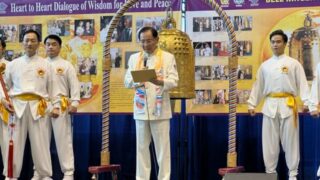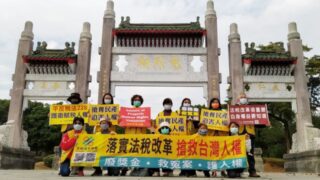The remote origins of transitional justice are in the distinction between vengeance and justice, as taught by wise men such as Emperor Wen of Han and Cesare Beccaria.
by Massimo Introvigne*
*A paper presented at the conference “A History of Human Rights, Trends in Authoritarian Justice, and Authoritarian Persecution,” Taipei, July 28, 2023.


Transitional justice is a modern concept, originating from the need of restoring justice after the dictatorial regimes fell in Latin America and then in Eastern Europe. It was consecrated by the Truth and Reconciliation Commission set up by Nelson Mandela after the end of apartheid in South Africa, and headed by Anglican Archbishop Desmond Tutu.
However, the spirit of “transitional” justice, in the sense of rectifying justice after a time of chaos and injustice, is very old. Anthropologists and historians have long studied the passage from vengeance to justice. Primitive societies were dominated by the idea of vengeance. If you kill my brother, I should exact vengeance against you and kill your brother. The problem is, I may kill your two brothers and so your family will need to kill yet another brother of mine, and so on. The system of vendetta can go on for years and years, and sometimes for centuries.
Scholars of the Italian beautiful island called Sardinia have studied how vendettas in the mountains among families could go on for years and indeed centuries. Members of old families killed each other without even remembering what originated this. In fact, although now things are finally changing, vendetta was so common that until the beginning of the 20th century when a boy was born in the Sardinian mountains (a boy, not a girl) the parish priest would bless the boy and also bless some gun bullets and give them to him, so he could continue the vendetta against the enemy families when he will grow up.


Historians regard as a great progress in the path of humanity when private vengeance was replaced by public justice, when individuals and families were not simply seeking revenge against those who had committed crimes against them. They would go to a judge and a court of law, who would impartially administer justice. However, for many centuries the two notions of vengeance and justice were very confused. Particularly after periods of turmoils or bad government and injustice, those involved in the previous evil regimes were simply lynched or killed, not very often judged by tribunals. It is something that after revolutions we continue to see unfortunately up to this very day. Opponents, or those who had been responsible of wrongdoings, are tortured or sentenced to cruel punishments.
I would mention two important figures who helped humanity reflecting on the difference between vengeance and justice. One is the famous Italian legal scholar Cesare Beccaria, who lived in the 18th century. We can say that Beccaria had the the typical views of a man of the Enlightenment or the French “Lumières” about the Middle Ages. Today historians would disagree with him about his interpretation of how justice was administered in the Middle Ages. However, the main idea of Beccaria was to abolish torture and cruel corporal punishments. He believed that when a criminal is punished, the society is not seeking vengeance but is seeking a new harmony and a restoration of the common good. Despite his historical mistakes, I believe that this teaching of Beccaria is still valid.


In Chinese culture, you have the same teaching in much older times, actually in the second century before the Christian or the common era, with Emperor Wen of Han. Emperor Wen of Han was famous for being a very wise and moderate emperor. Of course, he was also famous for having introduced the examination for mandarins and public bureaucrats, which eliminated a lot of favoritism and injustice. And he is also known for trying to eliminate torture and replace the death penalty with whipping—of course, today we disagree with whipping too, but it was better than the death penalty. Interestingly, Emperor Wen believed that high taxes were a root cause of corruption and disharmony. He created a system with only two tax echelons, 1/60 and 1/30, meaning that the lowest tax was 1.67% and the highest tax was 3.33%.
Emperor Wen dreamed of a world where criminals or those who had been part of past bad or unjust governments could simply be gently persuaded to amend their ways or reform, without the need for death penalty, cruel punishments, and even for jail.


Of course, some of these ideas are utopian but I believe both Beccaria and Emperor Wen of Han teach us what transitional justice should be all about. We should not seek vengeance. We should seek a restoration of harmony.
This is also important for Taiwan and for the Tai Ji Men case. In the spirit of a return to conscience, we and Tai Ji Men are not asking for vengeance. Vengeance is not part of a world based on conscience. We are asking for practical, political ways of rectification of injustice, which means giving back to Tai Ji Men their due; punish with humanity—because punishment is not vengeance, sometime it has to do with justice—people who committed serious wrongdoings, be they prosecutors or tax bureaucrats; and most importantly, restore the reputation of Tai Ji Men Shifu and dizi who have been slandered.


So, in promoting transitional justice, which of course should extend not only to the authoritarian period in Taiwan but also to the post-authoritarian period and what happened in 1996 in the political crackdown against religious movements, we should remember this true spirit of transitional justice.
We can ask for transitional justice with good conscience. We should not be afraid, we should strongly believe that our position is right, and that we have the right to ask for transitional justice because transitional justice is not about vengeance. It is about justice, and everybody needs and deserves justice, particularly after a transition from an authoritarian to a non-authoritarian regime. We all love justice. Tai Ji Men surely deserves justice.









